Ever woken up with red, itchy patches that just won’t calm down?
At first, you think it’s dry skin. Maybe an allergy. But then it lingers, spreads, and starts messing with your sleep and confidence.
That’s eczema—also called atopic dermatitis—and you’re far from alone. More than 31 million Americans live with it, and millions more worldwide struggle with flare-ups that come and go without warning.
The good news? Eczema is manageable. With the right mix of medical care, home remedies, and prevention, you can take control of your skin again.
This guide breaks down:
- Dermatologist-backed treatments that actually work
- Natural remedies you can try at home
- Everyday habits to prevent flare-ups long-term
- Answers to the most common questions
By the end, you’ll have a toolbox of solutions to reduce irritation, strengthen your skin barrier, and live more comfortably.
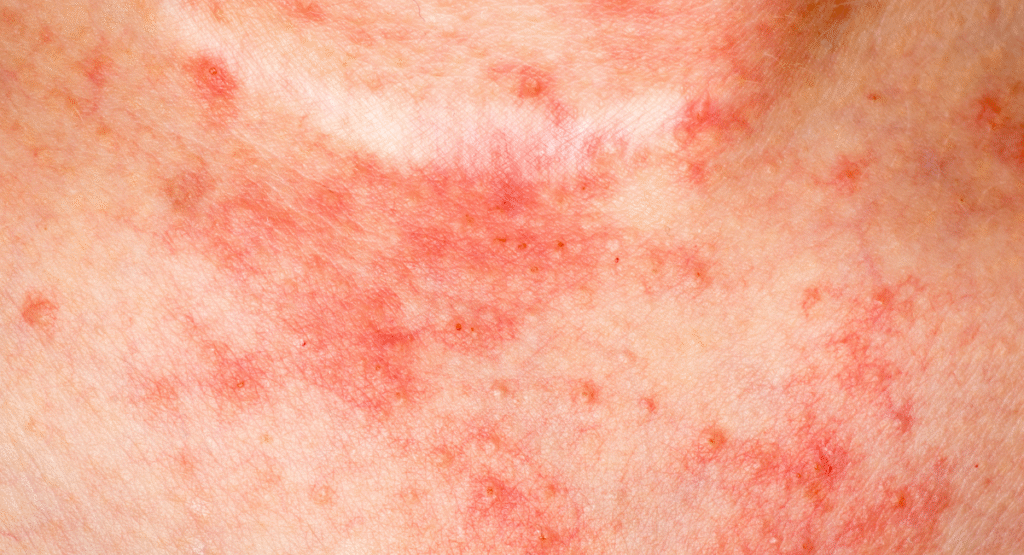
What Is Eczema?
Eczema is a chronic inflammatory skin disorder that weakens the skin’s protective barrier. This makes it more sensitive to irritants, allergens, and even stress.
It usually shows up in flare-ups—periods where the skin gets red, itchy, and inflamed. For some, flare-ups last a few days. For others, they drag on for weeks.
What Does Eczema Look Like?
- Texture: Dry, scaly, flaky, or cracked skin
- Color: Pink or red on lighter skin; brown, purple, or gray on darker skin
- Symptoms: Itching (often intense), stinging, occasional oozing or crusting, and thickened skin if it’s long-term
Common Areas Affected
- Elbows and behind the knees
- Wrists and ankles
- Face (around the eyes and mouth)
- Neck, scalp, and hands
What Triggers Eczema Flare-Ups?
Eczema flare-ups don’t happen randomly—they’re often triggered by external or internal factors. Here’s a breakdown:
| Trigger Type | Examples |
| Environmental | Cold, dry air, humidity changes, pollution |
| Irritants | Soaps, detergents, fragrances, wool clothing |
| Allergens | Dust mites, pollen, pet dander |
| Lifestyle | Stress, lack of sleep, dehydration |
| Dietary | Dairy, gluten, nuts, soy (varies by person) |
| Genetics | Family history of eczema, asthma, hay fever |
👉 Tip: Keeping a flare-up journal can help you spot your personal triggers.
Read more: How to Identify Skin Triggers Naturally
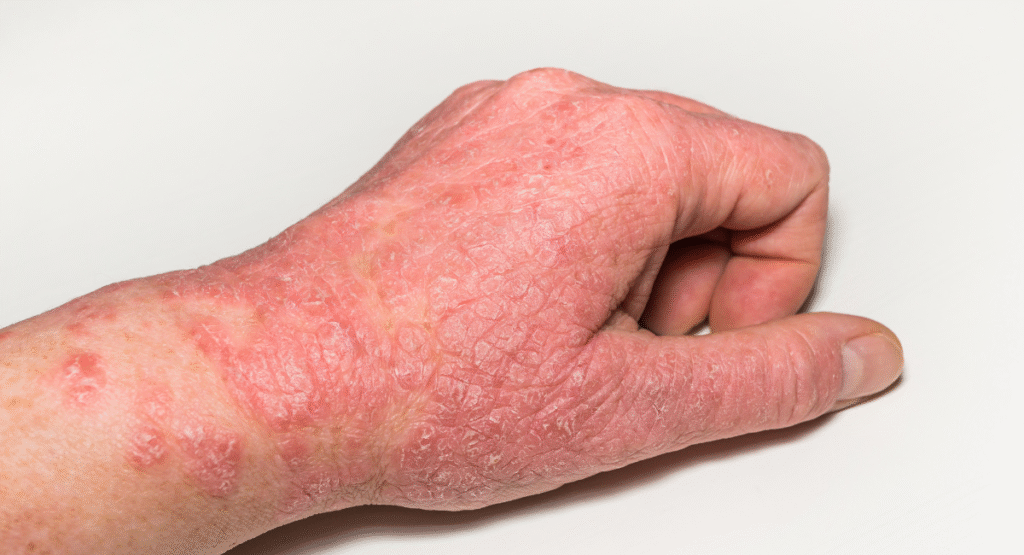
Medical Solutions: Dermatologist-Recommended Treatments
When flare-ups hit, medical treatments are often the fastest way to calm inflammation and itching.
1. Topical Corticosteroids
- Best for: Mild to moderate eczema
- Examples: OTC hydrocortisone, prescription creams like betamethasone
- How to Use: Apply a thin layer once or twice daily during flare-ups
- Caution: Long-term use can thin the skin
Source: American Academy of Dermatology
2. Topical Calcineurin Inhibitors
- Best for: Delicate areas like the face and eyelids
- Examples: Tacrolimus (Protopic), pimecrolimus (Elidel)
- Bonus: Safe for long-term use without steroid side effects
3. Moisturizers (Barrier Repair Creams)
- Best Options: Ceramide-rich creams like CeraVe, Eucerin Eczema Relief, Vanicream
- When to Use: Immediately after bathing to lock in hydration
4. Antihistamines (for Itch Relief)
- Daytime: Non-drowsy options like cetirizine (Zyrtec), loratadine (Claritin)
- Nighttime: Diphenhydramine (Benadryl) to reduce scratching during sleep
5. Prescription Treatments (For Severe Eczema)
- Dupilumab (Dupixent): Biologic injection for uncontrolled eczema
- Phototherapy (Narrowband UVB): Controlled light therapy under medical supervision
- Prescription Options for Chronic Skin Conditions
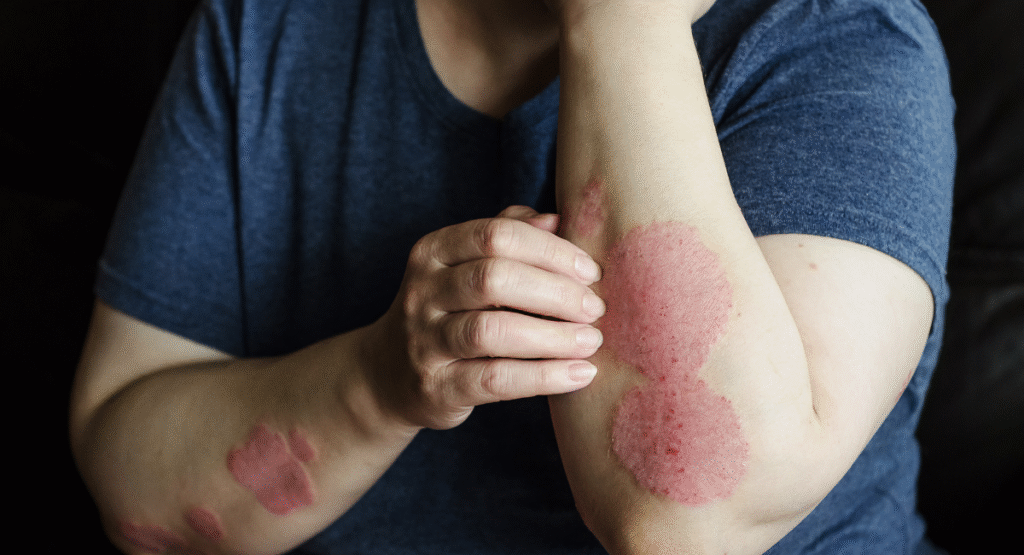
Home Remedies: Natural, Science-Backed Relief
Not every flare-up needs heavy medication. For mild eczema, natural remedies can bring quick relief.
| Remedy | How It Helps | How to Use | Relief Timeline |
| Colloidal Oatmeal Soak | Reduces itching, calms inflammation | Add 1 cup to lukewarm bath, soak 10–15 mins | 2–5 days |
| Coconut Oil (Extra Virgin) | Antibacterial + hydrates deeply | Apply thin layer twice daily | 3–7 days |
| Aloe Vera Gel | Cooling, anti-inflammatory | Apply pure gel 2x/day | 3–4 days |
| Honey & Turmeric Paste | Antimicrobial + soothing | Mix 1 tsp honey + ¼ tsp turmeric, apply 10 mins, rinse | 2x/week |
| Diluted Apple Cider Vinegar | Restores skin pH, antibacterial | 1 part ACV + 3 parts water, dab with cotton | 2–4 days |
⚠️ Always patch-test natural remedies before applying to large areas. National Eczema Association
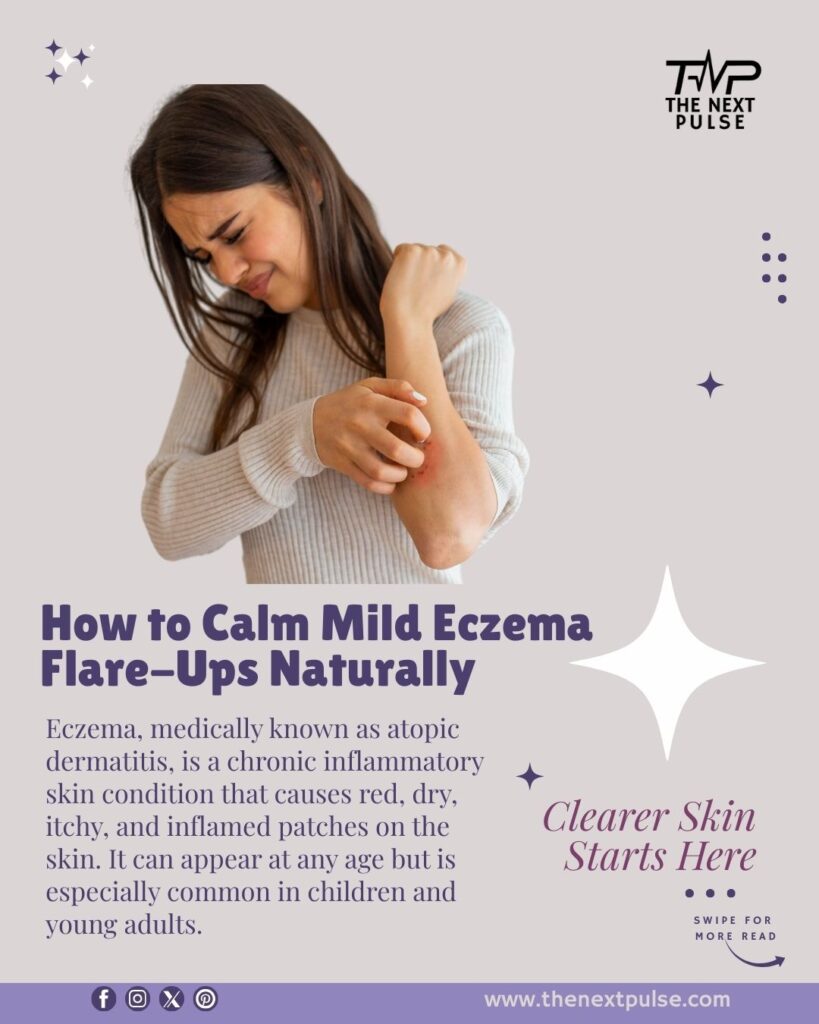
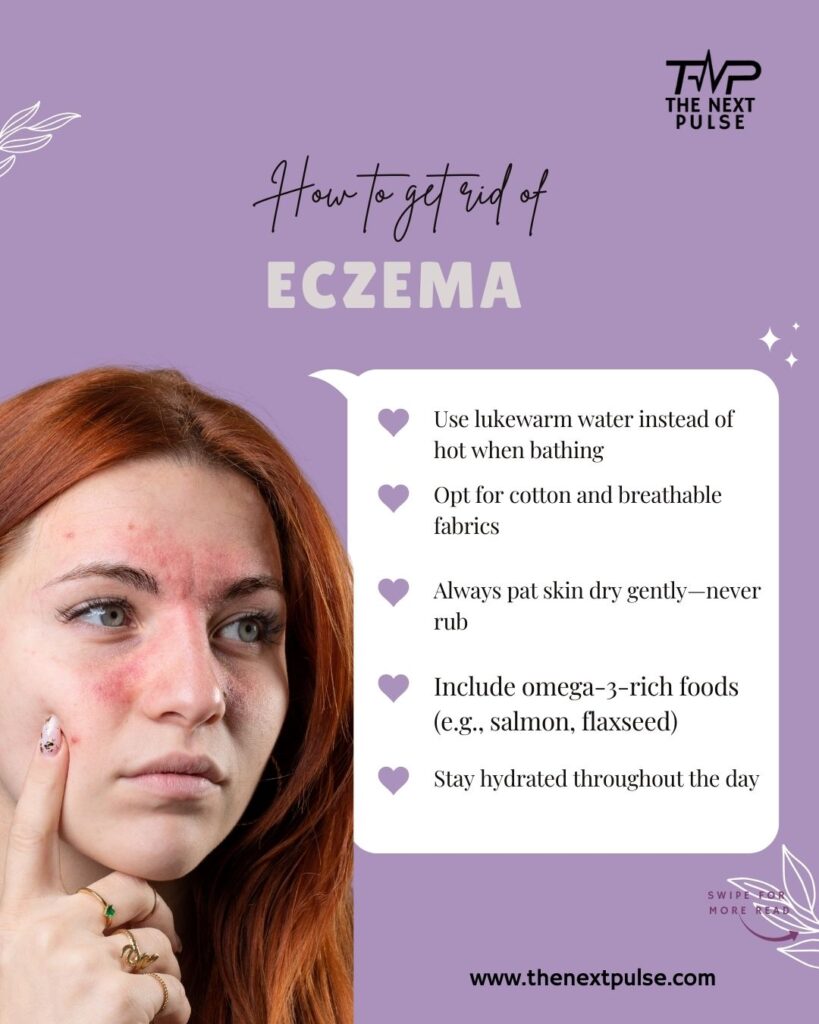
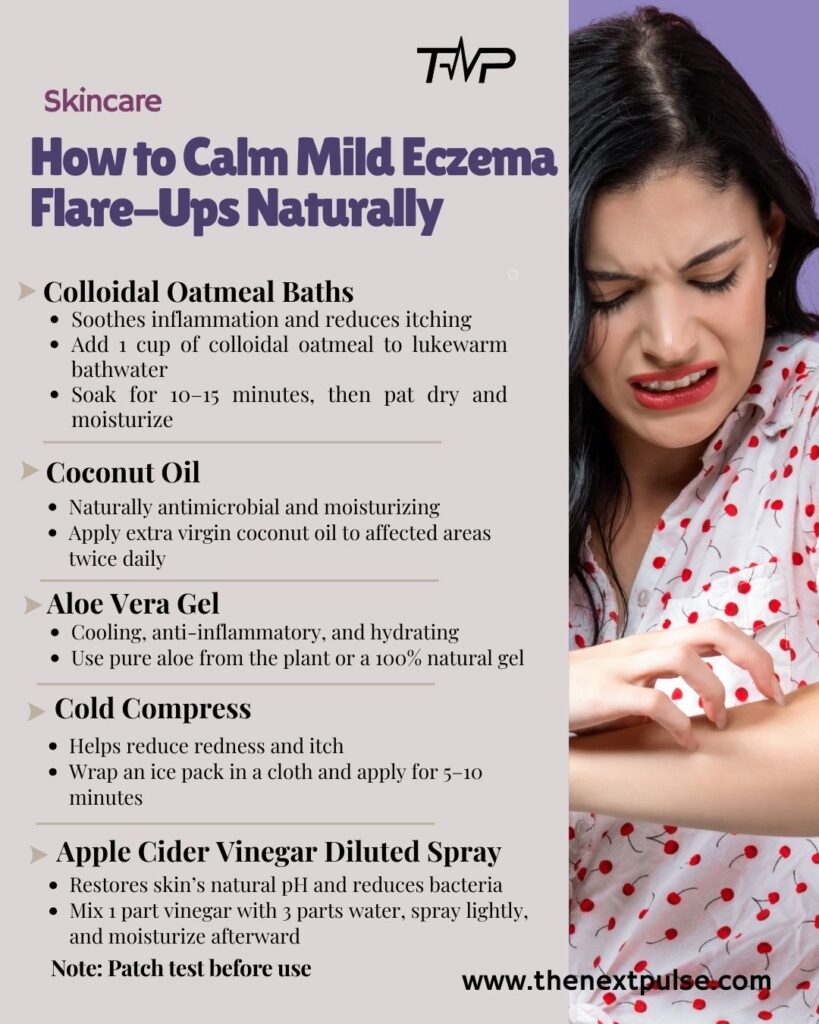
Preventing Eczema Flare-Ups Long-Term
The best treatment for eczema? Avoiding flare-ups in the first place. Here’s a prevention checklist:
Skin Care Routine
- Stick to gentle, fragrance-free cleansers (Cetaphil, La Roche-Posay Lipikar)
- Apply moisturizer within 3 minutes of bathing
- Limit to one short shower daily
Daily Habits
- Keep nails short to prevent skin damage from scratching
- Use a humidifier in dry climates or winter
- Wear cotton clothing—skip wool and synthetics
- Stay hydrated (6–8 glasses of water daily)
Diet & Supplements
- Eat anti-inflammatory foods like salmon, flaxseeds, spinach, and blueberries
- Consider omega-3s and probiotics (consult your doctor first)
🧴 Dermatologist Pro Tip:
“Eczema isn’t just about skin. It’s also about your immune system and environment. Managing it long-term means combining trigger avoidance with consistent barrier care.”
Read more: Best Foods for Healthy, Glowing Skin
Conclusion
Eczema can be stubborn. One week your skin looks calm, the next it’s itchy, red, and begging for relief. But here’s the truth: with the right balance of medical treatment, natural remedies, and daily prevention, you can get ahead of flare-ups.
- Start by identifying your triggers.
- Build a gentle skincare routine.
- Use dermatologist-approved creams when needed.
- Support your skin with natural, soothing remedies.
Don’t wait until your skin is screaming for help. Start small, stay consistent, and see a dermatologist if things don’t improve. Healthy, calm skin is possible—it just takes the right care and patience.
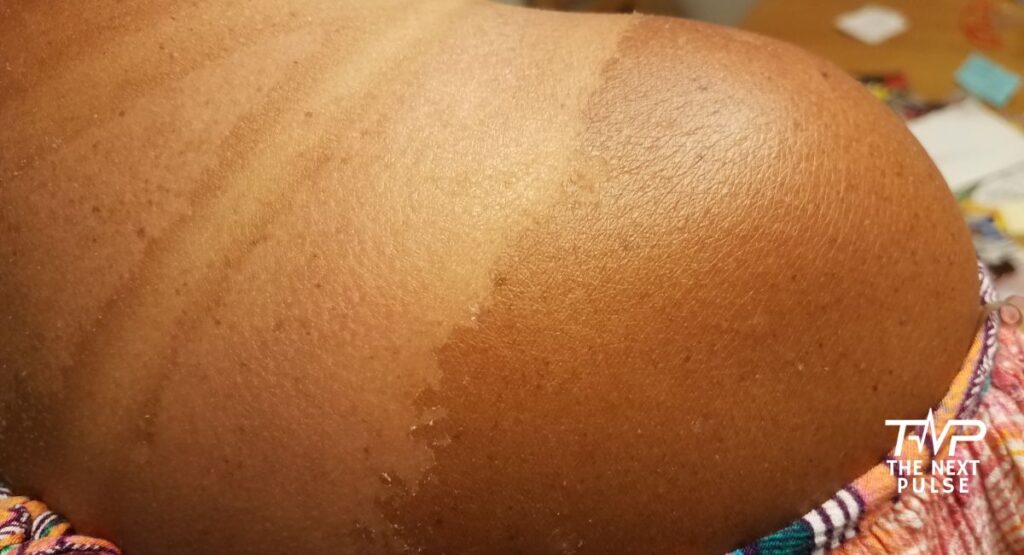
Soothe and Prevent Sunburn Naturally
Got a little too much sun and now you’re paying the price? We’ve all been there. One fun afternoon outdoors can turn into days of burning, peeling, and discomfort. Whether you forgot to reapply sunscreen or underestimated the intensity of UV rays, sunburn isn’t just painful—it’s your skin’s cry for help.
FAQ
1. Can stress really trigger eczema?
Yes. Stress raises cortisol levels, which weakens the skin barrier and triggers flare-ups.
2. Is eczema contagious?
No. eczema is not an infection and cannot spread through touch.
3. Can I wear makeup if I have eczema?
Yes—choose hypoallergenic fragrance-free products. Avoid makeup during active flare-ups.
4. Should I exfoliate eczema-prone skin?
Avoid harsh scrubs. If needed, use mild chemical exfoliants like lactic acid (with medical guidance).
5. Will I outgrow eczema?
Children sometimes outgrow it. But adult-onset eczema can persist. Good skin care helps manage it long-term
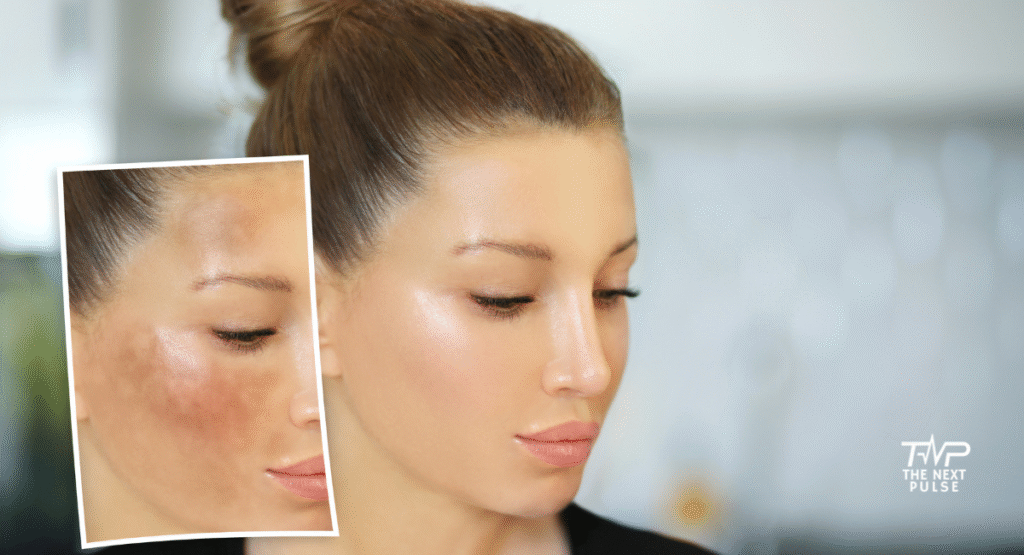
Treat Stubborn Hyperpigmentation Naturally
Dark patches, acne scars, random sun spots, darker patches on the skin—hyperpigmentation loves to show up uninvited and can make your complexion look uneven, dull, or prematurely aged. And the worst part? They take forever to move out. Doesn’t matter if it came from a pimple, pregnancy hormones, or just too much time outside, the result is the same: uneven skin that makes you feel older, duller, or just plain annoyed.
